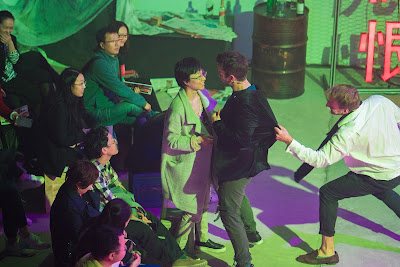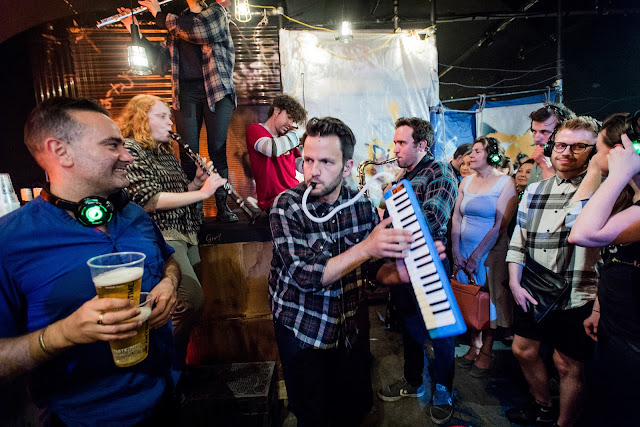 |
| Silent Opera - Vixen (Photo Robert Workman) |
 |
| Daisy Evans |
Daisy describes Silent Opera as immersive, opera which happens all around you. Later in our conversation she explains that the productions are not promenade, the audience members sit down and are part of the set, becoming active participants in the drama. But Silent Opera's particular feature is that the audience members are all provided with headphones and listen to the opera on them.
 |
| Silent Opera |
Daisy is most emphatic that the company wants the audience's experiences to really count, and that the headphones should never simply be a gimmick. Instead audience members should feel like they are in their own world. 100 people quietly concentrating is very magical indeed, and you don't get the problem of hearing people next to you rattling sweet packets.
The audience can make the decision what to listen to
When the company first started they recorded an orchestral track which was used to accompany the singers. This accompanying track is recorded in small sections, so that the stage manager cues each section giving the performance a freedom and live feeling which would not come with singers performing to an ordinary backing track. Later on the company experimented with purely electronic accompanying tracks, but for Vixen they are using a mix of a recorded orchestra, electronics and five actor/musicians performing live in the character of buskers. A new feature for the performances of Vixen is a separate sound-track evoking the outside world, and rather like an art installation. The audience can make the decision what to listen to, either through the headphones or not, in the latter case they will hear the live singers and the buskers without the additional accompanying tracks.
 |
| Silent Opera - Giovanni - 2016 |
Daisy always wanted to be a director, and was interested in exploring areas that no-one else was, and trying to do opera in a real way. This isn't just about how she approached the text, she is interested in how audiences react and how they are presented with the material, she is also interested in who the audience is. She found that though there were exciting things happening in film and theatre, there seemed to be a gap in opera production. When she first started, seven years ago, there was very little small scale fringe opera, perhaps just the Grimeborn Festival which was in its early stages. She want to see Punchdrunk's immersive production of The Duchess of Malfi which was presented by English National Opera but thought it limiting that the audience had to follow the orchestra round, and this took time.
How to do immersive opera in a found space yet keep the orchestra?
So the question was, how to do immersive opera in a found space yet keep the orchestra? She was insistent on keeping the orchestra, because for Daisy the orchestral accompaniment is part of what opera is, reducing down to a couple of instruments does not feel the same. She worked as a staff director in a number of opera houses, so understood the power of opera accompanied by a full orchestra.
 |
| Silent Opera - Boheme - 2012 |
Daisy received a Old Vic New Voices Bursary and she was one of the first Sky Academy Arts Scholarships, and this funding helped to get Silent Opera's first venture, Orfeo off the ground. It has taken time to get the formula right, blending live and recorded soundes, but she feels that they are approaching a good balance. Past productions have included Orfeo, Dido, Boheme and Giovanni as well as a contemporary piece.
The singers have to dig deeper and find very convincing reasons for doing things
Daisy is very much inspired by film in the way she directs and she talks about adding a layer of reality to the piece in a way which cannot easily be done in larger theatres. The singers have to dig deeper and find very convincing reasons for doing things, the audiences need to feel the reality of the performance and singers cannot get away simply with gestures and a character performance. It is challenging for the singers, some love it and she has only had one singer hate it. She adds that the singers who want to act (as all opera singers do) really enjoy it. There is, also, the added challenge of singing with one ear blocked (with the singers' earpiece).
This means that the moment the company starts technical rehearsals, things get complicated, and music director Stephen Higgins has been working very hard. Singers can in fact choose what they want to have in their earpieces, and for more complex passages can have a click track.
She clearly does relish a challenge
 |
| Keel Watson - Verdi: Falstaff - Fulham Opera at Grimeborn Opera Festival (© Robert Workman 2015) |
She enjoys directing in the theatre, finding it rally far away from what she is doing with Silent Opera, 'in a good way'. When working in mainstream opera it requires a different set of skills, and her mind simply clicks into this different place. Partly this is because she spent so many years as an assistant director and revival director. She also wants to try and change the audience experience in the theatre, and perhaps make the audience wake up a bit.
'Is what you are doing achievable?' and 'What makes it look cheap'
 |
| Gemma Summerfield, Bethan Langford, Alexander Otterburn, David Shaw, Eddie Wade - Mozart: Cosi fan tutte - Bury Court Opera 2017 |
She feels that for the larger companies, opera has become big international business, and is no longer about the art of making something new and interesting. And audiences are not responding, so that big names are no longer getting people in. Yet opera is not dead, and opera companies need to be looking elsewhere and she feels that this is why English National Opera is supporting Silent Opera. She hopes that ideas tried out by Silent Opera will be picked up by other companies.
Vixen is running at the Vaults until 10 June, and will then be travelling to the Helsinki Festival in August, and touring to Beijing Music Festival. Silent Opera did Giovanni in China last year; it did well and sold out. The Chinese reacted well to the Silent Opera concept, and Daisy points out that they are a young country when it comes to Western culture, and audiences have generally not been listening to grand opera for long.
 |
| Silent Opera - Vixen (Photo Robert Workman) |
She has a list of operas which she would like to direct, and names Strauss's Salome, Britten's Peter Grimes, and Bartok's Duke Bluebeard's Castle (this latter is her top one for Silent Opera but the libretto is still in copyright). She also adds that she would love to direct a big staging of Verdi's Falstaff
Elsewhere on this blog:
- Wit and sunshine: Cimarosa's Il matrimonio segreto from Pop-Up Opera - Opera review
- Musical menagerie: Christopher Maltman & Malcolm Martineau at Wigmore Hall - concert review
- Puccini's swallow makes a welcome return: La Rondine at Opera Holland Park - Opera review
- Not just G&S: Solomon & Burnand's Pickwick - CD review
- A fine introduction: Chamber music of Grazyna Bacewicz - CD review
- Beware the Spider!: Intriguing debut disc from Palisander recorder quartet - CD review
- Access all Areas, why are few theatres a pleasure to leave? - feature article
- Gaudent in coelis: Music by Joanna Marsh, Judith Bingham, Sally Beamish - CD review
- Schubert in context: Decades: A Century of Song, 1820s from Malcolm Martineau & friends - CD review
- Colour and movement: Orchestra music by Tomasz Opalka on Warner Classics - CD review
- Home








%20Bill%20Smith_Norwich%20Cathedral.jpg)
.jpg)
No comments:
Post a Comment